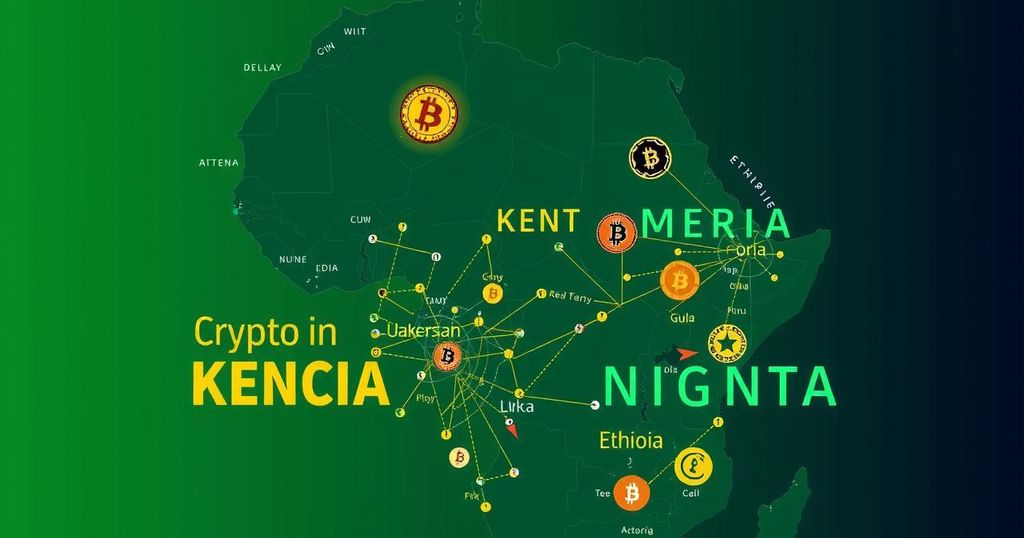Africa’s crypto landscape is witnessing notable developments, particularly in Nigeria, Kenya, and Ethiopia. Nigeria has released Binance executive Tigran Gambaryan, indicating a shift in regulatory stance. Kenya’s authorities are intensifying tax compliance measures targeting crypto users, while Ethiopia’s BitFuFu expands Bitcoin mining operations. Amidst these advancements, malware threats pose significant risks to the crypto sector, signaling a need for vigilance.
This week in Africa’s crypto landscape, significant developments emerge from Nigeria, Kenya, and Ethiopia, revealing changing dynamics in the continent’s approach to digital currencies. Nigeria has recently re-established its ties with Binance following the release of Tigran Gambaryan, a U.S. executive previously embroiled in legal challenges related to money laundering. This decision signals a potential easing of regulatory tensions as Nigeria continues to adopt a formal framework for the taxation of cryptocurrency operations. Meanwhile, the Kenya Revenue Authority (KRA) is actively pursuing a strategy to monitor and tax crypto transactions, having implemented a 3% tax on crypto earnings, and signaling a commitment to expanding compliance mechanisms. In Ethiopia, BitFuFu, a Nasdaq-listed Bitcoin mining entity, is advancing its operations through strategic acquisitions, leveraging the country’s renewable energy resources to enhance its profitability. However, the landscape is not without challenges, as Africa suffers from cybersecurity threats affecting cryptocurrency platforms, necessitating greater vigilance among stakeholders. From Nigeria’s reconciliatory stance towards cryptocurrency exchanges to the intensified tax initiatives in Kenya and Ethiopia’s growing influence in Bitcoin mining, Africa’s crypto ecosystem is evolving and demonstrating both opportunities and vulnerabilities. Regulatory frameworks and compliance measures are critical in fostering a secure environment for digital asset operations, yet the need for enhanced protection against cyber threats looms large as the sector continues to grow.
The ongoing developments in Africa’s cryptocurrency market illustrate a continent grappling with the dual necessity of regulating digital assets while simultaneously embracing their potential economic benefits. Countries such as Nigeria and Kenya have been at the forefront of adopting cryptocurrencies, though they have also faced challenges related to regulation and taxation. The recent moderation in Nigeria’s stance on Binance reflects a broader trend towards regulatory clarity. In Kenya, the KRA’s initiative indicates an attempt to formalize the tax landscape for cryptocurrencies, which is crucial for maintaining national fiscal health amidst rising crypto engagement. Ethiopia’s advancements in Bitcoin mining underscore the potential for renewables in supporting the crypto industry, though it also exemplifies the rapid changes occurring within the sector. Additionally, the emergence of malware threats highlights the ongoing risks associated with digital financial platforms, underscoring the importance of cybersecurity measures.
In conclusion, Africa’s cryptocurrency landscape is experiencing transformational shifts characterized by regulatory developments, increased tax compliance efforts, and enhanced engagement in mining activities. The interplay between fostering innovation and implementing protective measures reflects a maturing ecosystem that requires constant adaptation to evolving threats and opportunities. The commitment to establishing robust frameworks for cryptocurrency in Africa will be crucial for continuing to attract investment, enhance compliance, and secure user assets across the continent. As these nations navigate their respective challenges, the emphasis on collaboration, regulatory clarity, and cybersecurity will be pivotal in shaping the future of cryptocurrency in Africa.
Original Source: 99bitcoins.com






